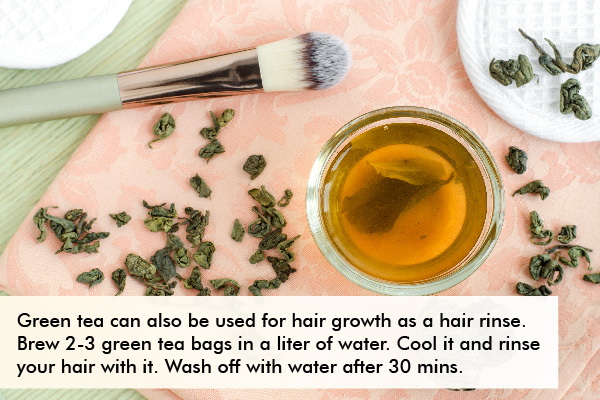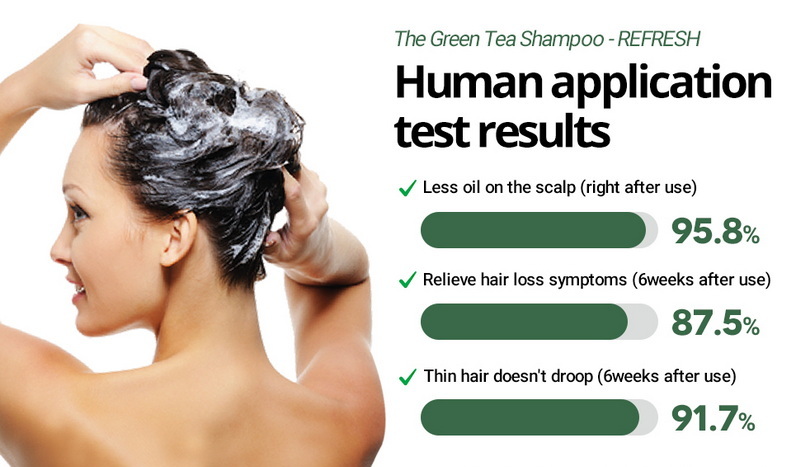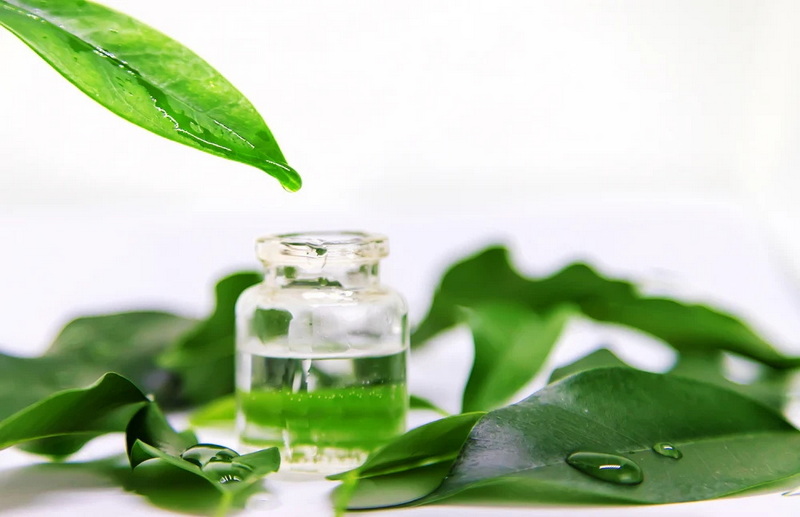Content Menu
● What is Green Tea Extract?
● Nutritional Composition of Green Tea
● How Green Tea Extract Benefits Hair
● How to Use Green Tea Extract for Hair
● Potential Risks and Side Effects
● Conclusion
● FAQ
>> 1. Can green tea extract reverse hair loss?
>> 2. How long does it take to see results from using green tea extract on hair?
>> 3. Is it safe to use green tea extract on my hair every day?
>> 4. Can I use green tea extract if I have a sensitive scalp?
>> 5. Are there any drug interactions with green tea extract?
● Citations:
Green tea, derived from the Camellia sinensis plant, has been a popular beverage for centuries, celebrated for its numerous health benefits. In recent years, green tea extract has garnered attention for its potential to promote hair growth and improve overall hair health[7]. This article delves into the science behind green tea extract and its effects on hair, exploring its benefits, how to use it, and what the research says.

What is Green Tea Extract?
Green tea extract is a concentrated form of green tea, containing a high amount of antioxidants and other beneficial compounds. These compounds, particularly catechins, are responsible for many of the health benefits associated with green tea[4]. The most abundant and well-studied catechin in green tea is epigallocatechin gallate (EGCG), known for its antioxidant, anti-inflammatory, and anti-androgen properties[4].
Nutritional Composition of Green Tea
Green tea contains several elements that contribute to its health benefits[6]:
-Catechins: Primarily EGCG, which has antioxidant and anti-inflammatory effects[4].
-Caffeine: A stimulant that can improve blood flow and energy levels[1].
-Vitamin B: Helps to moisturize the hair and reduce breakage[10].
-Vitamin C: Protects hair and scalp from sun damage[6].
-Minerals: Including zinc and selenium, which are essential for hair health[6].
-Carotenoids: Act as antioxidants[6].
How Green Tea Extract Benefits Hair
Green tea extract offers several potential benefits for hair health, primarily due to its antioxidant, anti-inflammatory, and anti-androgen properties[4].
1. Promotes Hair Growth
EGCG in green tea extract appears to extend the anagen (growth) phase of hair follicles and reduce the telogen (shedding) phase[1]. A 2017 study showed green tea's effectiveness in hair regeneration in mice when combined with traditional Asian medicines[1]. Additionally, a 2007 study demonstrated that EGCG promoted hair growth in human dermal papilla cells, both in vitro and in vivo[1].
2. Combats Hair Loss
By inhibiting the activity of hormones that induce hair loss and stimulating hair follicles to promote hair regrowth, the epigallocatechin gallate (EGCG) in green tea may help prevent hair loss[7].
3. Blocks Dihydrotestosterone (DHT)
Green tea contains compounds that can inhibit the conversion of testosterone to DHT, a hormone associated with hair loss[4]. By blocking DHT, green tea helps maintain the health of hair follicles and supports hair growth[4]. A 2016 study found that catechins in green tea prevent DHT-induced cell death, with EGCG reducing 5α-reductase activity, which converts testosterone into DHT[1].
4. Reduces Inflammation
Inflammation can disrupt the hair growth cycle and lead to hair loss[4]. Green tea's anti-inflammatory properties help reduce scalp inflammation, promoting optimal conditions for hair growth[4]. The catechins in green tea inhibit the production of pro-inflammatory molecules, alleviating scalp inflammation[4].
5. Provides Antioxidant Protection
Green tea's antioxidants scavenge free radicals that can damage hair follicles and impede growth[4]. Reducing free radicals in the scalp helps neutralize oxidative stress, significantly contributing to hair loss[4]. Green tea promotes a healthier scalp environment for hair growth by reducing oxidative stress[4].
6. Improves Blood Circulation
Green tea leaf extract can increase scalp blood flow, which is essential for delivering nutrients and oxygen to hair follicles[4]. Better blood circulation can lead to improved hair growth and overall scalp health[7]. A study involving 15 participants showed that consuming supplements containing green tea extract for 12 weeks increased skin blood flow and oxygen delivery by 29%[7].
7. Strengthens Hair
The nutrients in green tea, such as vitamins and minerals, can strengthen hair and reduce breakage[10]. Vitamin B, for example, helps to moisturize the hair, reducing breakage and split ends[10]. Stronger hair is less prone to damage and can grow longer and healthier[10].
8. Prevents Dandruff
Green tea can help to get rid of itchy, flaky, and oily scalp issues[6]. Green tea also aids in fighting scalp dryness[6].

How to Use Green Tea Extract for Hair
There are several ways to incorporate green tea extract into your hair care routine[3]:
-Green Tea Shampoo: Choose a shampoo infused with green tea extract, focusing on applying it to the scalp and roots while massaging gently[3].
-Green Tea Conditioner or Hair Mask: Use a conditioner or hair mask containing green tea, ensuring coverage from roots to tips. Leave it on for the time specified on the product packaging, usually between 3–10 minutes[3].
-DIY Green Tea Hair Rinse: Steep 1–2 green tea bags in boiling water for about 5 minutes. After cooling, pour the tea over your hair as a final rinse in the shower[3].
-Additional Tips
-Drink Green Tea: Consume 1–2 cups (240–480 ml) of green tea daily to enrich your body with antioxidants[3].
-Apply Directly: Apply green tea extract directly to your scalp[7].
-Scientific Studies and Research
Several studies have investigated the effects of green tea extract on hair growth:
-Rodent Studies: One study found that 33% of mice who received green tea extract in their drinking water developed hair regrowth within six months, with an average surface regrowth rate of 1.6 mm2 per month[2].
-Human Studies: A small study using topical green tea-derived EGCG extract on the scalps of participants with alopecia showed significant increases in hair growth activity after four days[7].
-In Vitro Studies: Research has demonstrated that EGCG promotes hair growth in human dermal papilla cells in vitro and in vivo[1].
Potential Risks and Side Effects
While green tea is generally safe, there are some potential risks to consider:
-Toxicity: Green tea supplements and oils can contain significantly higher amounts of EGCG, potentially leading to liver toxicity and stomach upset[7]. It's important to adhere to the safe intake level of EGCG, which is 338 mg per day for supplements and 704 mg per day for brewed tea[7].
-Caffeine Sensitivity: Green tea contains caffeine, which may cause side effects such as insomnia, anxiety, and digestive issues in sensitive individuals[1].
Conclusion
Green tea extract offers promising benefits for hair health, supported by scientific research and its rich antioxidant and anti-inflammatory properties. From promoting hair growth and preventing hair loss to reducing inflammation and improving blood circulation, incorporating green tea extract into your hair care routine can lead to healthier, stronger, and more vibrant hair. Whether through shampoos, conditioners, hair rinses, or drinking green tea, there are numerous ways to harness the power of this natural remedy. However, it's essential to be mindful of potential risks and side effects, especially when using concentrated supplements.

FAQ
1. Can green tea extract reverse hair loss?
Green tea extract has shown promise in promoting hair regrowth and preventing hair loss due to its EGCG content, which stimulates hair follicles and reduces DHT levels[1][4]. While it may not completely reverse hair loss, consistent use can improve hair density and overall scalp health[7].
2. How long does it take to see results from using green tea extract on hair?
Results vary depending on the individual and the method of application. Some studies have shown improvements in hair growth activity within a few days of topical application[7], while others have observed hair regrowth over several months of consistent use[2].
3. Is it safe to use green tea extract on my hair every day?
Using green tea extract on your hair daily is generally safe, but it's essential to monitor for any adverse reactions or scalp irritation[7]. If you experience any negative effects, reduce the frequency of use[7].
4. Can I use green tea extract if I have a sensitive scalp?
If you have a sensitive scalp, start by using a diluted green tea solution or a product with a lower concentration of green tea extract[3]. Perform a patch test to check for any allergic reactions or irritation before applying it to your entire scalp[3].
5. Are there any drug interactions with green tea extract?
Green tea extract may interact with certain medications, such as blood thinners and stimulants[7]. Consult with a healthcare professional before using green tea extract, especially if you are taking any medications or have underlying health conditions[7].
Citations:
[1] https://www.diviofficial.com/blogs/ingredients/green-tea-extract-for-hair-growth
[2] https://camellix.com/wp-content/uploads/2018/05/Hair-Loss-green-tea.pdf
[3] https://feelgoodpal.com/blog/green-tea-for-hair/
[4] https://www.mdhair.co/article/green-tea-for-women-s-hair-loss
[5] https://pmc.ncbi.nlm.nih.gov/articles/PMC2569505/
[6] https://bebodywise.com/blog/green-tea-for-hair/
[7] https://www.healthline.com/nutrition/green-tea-for-hair
[8] https://www.researchgate.net/publication/336234823_Hair_Growth_Promoting_Activity_of_Green_Tea_Leaves_Camellia_sinensis_l_Ethanolic_Extract
[9] https://pubmed.ncbi.nlm.nih.gov/17092697/
[10] https://www.stbotanica.com/blog/green-tea-for-hair

 English
English 




























